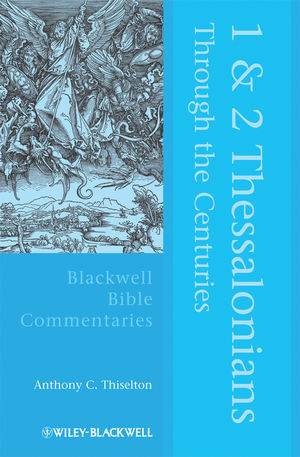1 and 2 Thessalonians Through the CenturiesISBN: 978-1-4051-9682-6
Hardcover
336 pages
December 2010, Wiley-Blackwell
 |
||||||
Series Editors’ Preface xi
Acknowledgments xiii
Abbreviations xv
Introduction 1
The Aims of Reception History 1
The Situation and Substance of 1 Thessalonians 7
The City of Thessalonica 10
Traditional and Nineteenth-Century Arguments about the Authenticity of 2 Thessalonians and Their Criticism 11
The Situation and Substance of 2 Thessalonians 15
Some Key Interpreters in the Reception History of 1 and 2 Thessalonians 19
1 Thessalonians 21
Paul’s Address, Thanksgiving, Prayer, and Reflection on His Visit (1 Thessalonians 1:1–10) 23
Address, Thanksgiving, and Prayer (1 Thess. 1:1–6a) 23
Introduction and Overview 23
The Apostolic Fathers and the Patristic Era 25
The Medieval Period 27
The Reformation and Post-Reformation Eras 29
The Eighteenth Century 33
The Nineteenth Century 35
Paul’s Reflection on His Visit: The Readers are an Example to Believers from Greece (1 Thess. 1:6b–10) 38
Introduction and Overview 38
The Subapostolic and Patristic Era 39
The Medieval Period 41
The Reformation and Post-Reformation Eras 43
The Eighteenth Century 46
The Nineteenth Century 48
Paul’s Autobiographical Reflections and Defense (1 Thessalonians 2:1–8) 50
Introduction and Overview 51
The Patristic Era 52
The Medieval Period 55
The Reformation and Post-Reformation Eras 58
The Eighteenth Century 61
The Nineteenth Century 62
How the Readers Received the Gospel (1 Thessalonians 2:9–16) 65
Introduction and Overview 65
The Patristic Era 68
The Medieval Period 70
The Reformation and Post-Reformation Eras 72
The Eighteenth Century 75
The Nineteenth Century 76
Paul’s Longing to See the Thessalonians and Timothy’s Visit and News (1 Thessalonians 2:17–3:13) 79
Introduction and Overview 79
The Patristic Era 81
The Medieval Period 85
The Reformation and Post-Reformation Eras 88
The Eighteenth Century 90
The Nineteenth Century 92
The Call to Holiness, Especially to Holiness and Love in Personal Relationships (1 Thessalonians 4:1–12) 95
Introduction and Overview 95
The Patristic Era 98
The Medieval Period 101
The Reformation and Post-Reformation Periods 103
The Eighteenth Century 108
The Nineteenth Century 110
The Living and the Dead Share Together in the Parousia and in the Resurrection (1 Thessalonians 4:13–18)
Introduction and Overview 115
The Patristic Era 120
The Medieval Period 129
The Reformation and Post-Reformation Eras 132
The Eighteenth Century 137
The Nineteenth Century 140
Note on “the Rapture” in Dispensationalist Views of 1 Thessalonians 4:13–17 143
The Day of the Lord: Timing and Light (1 Thessalonians 5:1–11) 146
Introduction and Overview 146
The Patristic Era 148
The Medieval Era 151
The Reformation and Post-Reformation Eras 154
The Eighteenth Century 156
The Nineteenth Century 158
Various Christian Duties and Closure (1 Thessalonians 5:12–28) 161
Introduction and Overview 161
The Patristic Era 162
The Medieval Era 167
The Reformation and Post-Reformation Eras 168
The Eighteenth Century 173
The Nineteenth Century 174
2 Thessalonians 177
Address, Greetings, and Thanksgiving (2 Thessalonians 1:1–4) 179
Introduction and Overview 179
The Subapostolic and Patristic Eras 180
The Medieval Period 182
The Reformation and Post-Reformation Eras 185
The Eighteenth Century 188
The Nineteenth Century 189
Encouragement and Prayer: The Judgment of God and the Revelation of Christ (2 Thessalonians 1:5–12) 191
Introduction and Overview 191
The Apostolic Fathers and the Patristic Era 193
The Medieval Church 197
The Reformation and Post-Reformation Eras 201
The Eighteenth Century 206
The Nineteenth Century 209
The Day of the Lord (2 Thessalonians 2:1–12) 211
Introduction and Overview of 2 Thess. 2:1–12 211
The Advent of Christ and the “Man of Sin” (2 Thess. 2:1–6a); Note on the Antichrist 213
Introduction and Overview 213
Note on the Antichrist 213
The Apostolic Fathers and the Patristic Period 217
The Medieval Period 223
The Reformation and Post-Reformation Eras 226
Eighteenth Century Pietism 229
The Nineteenth Century 230
“He Who Now Restrains” and “The Lawless One” (2 Thess. 2:6b–12) 231
Introduction and Overview 231
The Patristic Era 233
The Medieval Period 236
The Reformation and Post-Reformation Eras 239
The Eighteenth Century 242
The Nineteenth Century 242
Thanksgiving, Exhortation and Benediction (2 Thessalonians 2:13–17) 245
Introduction and Overview 245
The Subapostolic and Patristic Eras 246
The Medieval Era 248
The Reformation and Post-Reformation Eras 249
The Eighteenth Century 251
The Nineteenth Century 253
Further Prayer and Exhortation, Largely New Issues (2 Thessalonians 3:1–18) 256
Further Prayer (2 Thess. 3:1–5) 256
Overview 256
The Apostolic Fathers and the Patristic Period 257
The Medieval Era 259
The Reformation and Post-Reformation Eras 260
The Eighteenth Century 262
The Nineteenth Century 263
Exhortation and Admonition about “Idlers” or Undisciplined People (2 Thess. 3:6–13) 264
Introduction and Overview 264
The Subapostolic and Patristic Periods 265
The Medieval Period 268
The Reformation and Post-Reformation Eras 270
The Eighteenth Century 272
The Nineteenth Century 273
Final Exhortations, Greetings, and Benediction (2 Thess. 3:14–18) 274
Introduction and Overview 274
The Subapostolic and Patristic Periods 274
The Medieval Period 275
The Reformation and Post-Reformation Eras 277
The Eighteenth Century 278
The Nineteenth Century 279
Brief Biographies 281
Bibliography 288
Index of Biblical and Jewish Texts (Canonical and Deuterocanonical Order) 300
Index of Names 306
Index of Subjects 312



